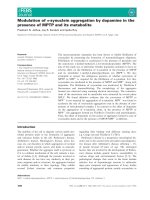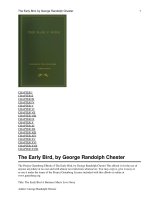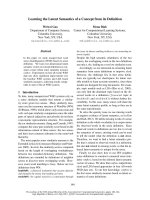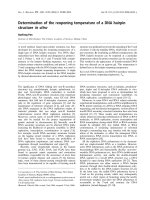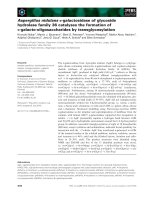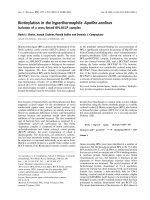The Project Gutenberg of The Romance of a Plain Man, by Ellen Glasgow pptx
Bạn đang xem bản rút gọn của tài liệu. Xem và tải ngay bản đầy đủ của tài liệu tại đây (2.27 MB, 1,139 trang )
The Project Gutenberg EBook of The Romance
of a Plain Man, by Ellen Glasgow
This eBook is for the use of anyone
anywhere at no cost and with
almost no restrictions whatsoever. You may
copy it, give it away or
re-use it under the terms of the Project
Gutenberg License included
with this eBook or online at
www.gutenberg.org
Title: The Romance of a Plain Man
Author: Ellen Glasgow
Release Date: October 20, 2009 [EBook
#30299]
Language: English
*** START OF THIS PROJECT GUTENBERG EBOOK
THE ROMANCE OF A PLAIN MAN ***
Produced by Suzanne Shell, Mary Meehan and
the Online
Distributed Proofreading Team atTHE ROMANCE
OF A PLAIN
MAN
BY ELLEN
GLASGOW
AUTHOR OF "THE
DELIVERANCE," "THE
VOICE OF THE PEOPLE,"
ETC.
New York
THE MACMILLAN COMPANY
1909
All rights reserved
Copyright, 1909,
By THE MACMILLAN
COMPANY.
Set up and electrotyped.
Published May, 1909.
Reprinted
May, July, August,
September, twice, October,
1909.
Norwood Press
J. S. Cushing Co.—Berwick
& Smith Co.
Norwood, Mass., U.S.A.
CONTENTS
CHAPTER I. In which I appear with Few
Pretensions
CHAPTER II. The Enchanted Garden
CHAPTER III. A Pair of Red Shoes
CHAPTER IV. In Which I play in the
Enchanted Garden
CHAPTER V. In which I start in Life
CHAPTER VI. Concerning Carrots
CHAPTER VII. In which I mount the First
Rung of the Ladder
CHAPTER VIII. In which my Education
Begins
CHAPTER IX. I learn a Little Latin and a
Great Deal of Life
CHAPTER X. In which I Grow Up
CHAPTER XI. In which I enter Society
and get a Fall
CHAPTER XII. I walk into the Country
and meet with an Adventure
CHAPTER XIII. In which I run against
Traditions
CHAPTER XIV. In which I test my
Strength
CHAPTER XV. A Meeting in the
Enchanted Garden
CHAPTER XVI. In which Sally speaks
her Mind
CHAPTER XVII. In which my Fortunes
Rise
CHAPTER XVIII. The Principles of Miss
Matoaca
CHAPTER XIX. Shows the Triumph of
Love
CHAPTER XX. In which Society receives
Us
CHAPTER XXI. I am the Wonder of the
Hour
CHAPTER XXII. The Man and the Class
CHAPTER XXIII. In which I walk on
Thin Ice
CHAPTER XXIV. In which I go Down
CHAPTER XXV. We face the Facts and
Each Other
CHAPTER XXVI. The Red Flag at the
Gate
CHAPTER XXVII. We close the Door
behind Us
CHAPTER XXVIII. In which Sally Stoops
CHAPTER XXIX. In which we receive
Visitors
CHAPTER XXX. In which Sally Plans
CHAPTER XXXI. The Deepest Shadow
CHAPTER XXXII. I come to the Surface
CHAPTER XXXIII. The Growing
Distance
CHAPTER XXXIV. The Blow that Clears
CHAPTER XXXV. The Ultimate Choice
Mr. JAMES LANE ALLEN'S NOVELS
Mr. F. MARION CRAWFORD'S
NOVELS
THE ROMANCE OF
A PLAIN MAN
CHAPTER I
IN WHICH I APPEAR WITH
FEW PRETENSIONS
As the storm broke and a shower of hail
rattled like a handful of pebbles against
our little window, I choked back a sob
and edged my small green-painted stool a
trifle nearer the hearth. On the opposite
side of the wire fender, my father kicked
off his wet boots, stretched his feet, in
grey yarn stockings, out on the rag carpet
in front of the fire, and reached for his
pipe which he had laid, still smoking, on
the floor under his chair.
"It's as true as the Bible, Benjy," he said,
"that on the day you were born yo' brother
President traded off my huntin' breeches
for a yaller pup."
My knuckles went to my eyes, while the
smart of my mother's slap faded from the
cheek I had turned to the fire.
"What's become o' th' p-p-up-p?" I
demanded, as I stared up at him with my
mouth held half open in readiness to break
out again.
"Dead," responded my father solemnly,
and I wept aloud.
It was an October evening in my
childhood, and so vivid has my later
memory of it become that I can still see
the sheets of water that rolled from the
lead pipe on our roof, and can still hear
the splash! splash! with which they fell
into the gutter below. For three days the
clouds had hung in a grey curtain over the
city, and at dawn a high wind, blowing up
from the river, had driven the dead leaves
from the churchyard like flocks of startled
swallows into our little street. Since
morning I had watched them across my
mother's "prize" red geranium upon our
window-sill—now whipped into deep
swirls and eddies over the sunken brick
pavement, now rising in sighing swarms
against the closed doors of the houses,
now soaring aloft until they flew almost as
high as the living swallows in the belfry
of old Saint John's. Then as the dusk fell,
and the street lamps glimmered like
blurred stars through the rain, I drew back
into our little sitting-room, which glowed
bright as an ember against the fierce
weather outside.
Half an hour earlier my father had come
up from the marble yard, where he spent
his days cutting lambs and doves and
elaborate ivy wreaths in stone, and the
smell from his great rubber coat, which
hung drying before the kitchen stove,
floated with the aroma of coffee through
the half-open door. When I closed an eye
and peeped through the crack, I could see
my mother's tall shadow, shifting, not
flitting, on the whitewashed wall of the
kitchen, as she passed back and forth from
the stove to the wooden cradle in which
my little sister Jessy lay asleep, with the
head of her rag doll in her mouth.
Outside the splash! splash! of the rain still
sounded on the brick pavement, and as I
glanced through the window, I saw an old
blind negro beggar groping under the
street lamp at the corner. The muffled beat
of his stick in the drenched leaves passed
our doorstep, and I heard it grow
gradually fainter as he turned in the
direction of the negro hovels that bordered
our end of the town. Across the street, and
on either side of us, there were rows of
small boxlike frame houses built with
narrow doorways, which opened from the
sidewalk into funny little kitchens, where
women, in soiled calico dresses,
appeared to iron all day long. It was the
poorer quarter of what is known in
Richmond as "Church Hill," a portion of
the city which had been left behind in the
earlier fashionable progress westward.
Between us and modern Richmond there
were several high hills, up which the poor
dripping horses panted on summer days, a
railroad station, and a broad slum-like
bottom vaguely described as the "Old
Market." Our prosperity, with our
traditions, had crumbled around us, yet
there were still left the ancient church,
with its shady graveyard, and an imposing
mansion or two inherited from the
forgotten splendour of former days. The
other Richmond—that "up-town" I heard
sometimes mentioned—I had never seen,
for my early horizon was bounded by the
green hill, by the crawling salmon-
coloured James River at its foot, and by
the quaint white belfry of the parish of old
St. John's. Beneath that belfry I had made
miniature graves on summer afternoons,
and as I sat now opposite to my father,
with the bright fire between us, the
memory of those crumbling vaults made
me hug myself in the warmth, while I
edged nearer the great black kettle singing
before the flames.
"Pa," I asked presently, with an effort to
resume the conversation along cheerful
lines, "was it a he or a she pup?"
My father turned his bright blue eyes from
the fire, while his hand wandered, with an
habitual gesture, to his coarse straw-
coloured hair which stood, like mine,
straight up from the forehead.
"Wall, I'll be blessed if I can recollect,
Benjy," he replied, and added after a
moment, in which I knew that his slow
wits were working over a fresh attempt at
distraction, "but speaking of dawgs, it
wouldn't surprise me if yo' ma was to let
you have a b'iled egg for yo' supper."
Again the storm was averted. He was so
handsome, so soft, so eager to make
everybody happy, that although he did not
deceive even my infant mind for a minute,
I felt obliged by sheer force of sympathy
to step into the amiable snare he laid.
"Hard or soft?" I demanded.
"Now that's a matter of ch'ice, ain't it?" he
rejoined, wrinkling his forehead as if
awed by the gravity of the decision; "but
bein' a plain man with a taste for solids,
I'd say 'hard' every time."
"Hard, ma," I repeated gravely through the
crack of the door to the shifting shape on
the kitchen wall. Then, while he stooped
over in the firelight to prod fresh tobacco
into his pipe, I began again my insatiable
quest for knowledge which had brought
me punishment at the hand of my mother an
hour before.
"Pa, who named me?"
"Yo' ma."
"Did ma name you, too?"
He shook his head, doubtfully, not
negatively. Above his short growth of
beard his cheeks had warmed to a clear
pink, and his foolish blue eyes were as
soft as the eyes of a baby.
"Wall, I can't say she did that—exactly."
"Then who did name you?"
"I don't recollect. My ma, I reckon."
"Did ma name me Ben Starr, or just Ben?"
"Just Ben. You were born Starr."
"Was she born Starr, too?"
"Good Lord, no, she was born Savage."
"Then why warn't I born Savage?"
"Because she married me an' I was born
Starr."
I gave it up with a sigh. "Who had the
most to do with my comin' here, God or
ma?" I asked after a minute.
My father hesitated as if afraid of
committing himself to an heretical
utterance. "I ain't so sure," he replied at
last, and added immediately in a louder
tone, "Yo' ma, I s'pose."
"Then why don't I say my prayers to ma
instead of to God?"
"I wouldn't begin to worry over that at my
age, if I were you," replied my father, with
angelic patience, "seein' as it's near
supper time an' the kettle's a-bilin'."
"But I want to know, pa, why it was that I
came to be named just Ben?"
"To be named just Ben?" he repeated
slowly, as if the fact had been brought for
the first time to his attention. "Wall, I
reckon 'twas because we'd had
considerable trouble over the namin' of
the first, which was yo' brother President.
That bein' the turn of the man of the family,
I calculated that as a plain American
citizen, I couldn't do better than show I
hadn't any ill feelin' agin the Government.
I don't recollect just what the name of the
gentleman at the head of the Nation was,
seein' 'twas goin' on sixteen years ago, but
I'd made up my mind to call the infant in
the cradle arter him, if he'd ever answered
my letter—which he never did. It was then
yo' ma an' I had words because she didn't
want a child of hers named arter such a
bad-mannered, stuck-up, ornary sort,
